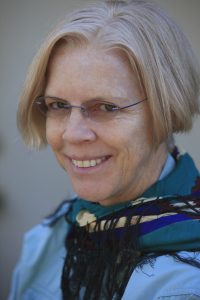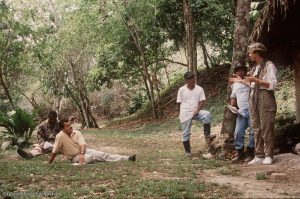Our President

Anabel Ford has distinguished herself as a Mesoamerican archaeologist in the field of settlement and environmental studies with a focus on the lowland Maya of Belize and Guatemala. She has a Ph.D. in Anthropology and works at the University of California, Santa Barbara, as a research archaeologist.
Discovering the major city of El Pilar in 1983 changed her academic course of study. Committed to understanding the ancient Maya landscape, Anabel surveyed from the Belize River valley to the El Pilar ridges to understand where the Maya lived, when they were living there, and how they lived at their settlements. Residing in the Maya forest and relying on the resources that were native to that place, she gained an appreciation for the local knowledge and economic value inherent in the rich surrounding environment.
She turned her focus to El Pilar, establishing the site as a new tour destination in the Maya world. There she integrates her academic exploration of ancient Maya practices and her involvement with and support for the people living in the region today.
 Since 1994, Anabel has spearheaded a unique development that focuses on the cultural and natural resource that embraces the Maya forest and links Belize and Guatemala. The El Pilar management design, endorsed by the governments of Belize and Guatemala, is an inclusive model involving government protection, academic research, local leadership, and community participation.
Since 1994, Anabel has spearheaded a unique development that focuses on the cultural and natural resource that embraces the Maya forest and links Belize and Guatemala. The El Pilar management design, endorsed by the governments of Belize and Guatemala, is an inclusive model involving government protection, academic research, local leadership, and community participation.
Anabel brings her extensive field experience and broadly inquisitive mind to address what has popularly been know as the mysterious Maya.
Dr. Ford’s Vision:
Climate change, natural resource scarcity, and food insecurity threaten our world’s collective future. It is essential to explore and consider all potential sources as we search for long-term solutions to these challenges. Exploring Solutions Past recognizes the potential that ancient traditions lend to this search for sustainable solutions, and identifies traditional practices that have proven longevity in sustaining both major cultures and their natural resources.
These past solutions hold important answers for our future, yet are overlooked by conventional knowledge and often labeled as too simple and unsophisticated to meet the needs of today. This prejudiced denial of the value of so-called “simple” technologies of traditional peoples prevents identifying and investigating ecological solutions that we so desperately need.
My vision is for Exploring Solutions Past to be an advocate for the sharing and application of sustainable traditional practices, knowing they must become widely respected and adopted as critical solutions to our global challenges. Archaeology is in a unique position to uncover how proven solutions of the past can be applied to today’s world.
With interdisciplinary collaboration that integrates the ancient with the modern, we can chart a way toward a sustainable future.
Our current focus centers on ancient Maya traditional farming, yet as Exploring Solutions Past expands, the goal is to embrace sustainable traditional practices from different cultures all over the world. This will build a network of advocates for these precious bodies of knowledge that are at risk of dying out.